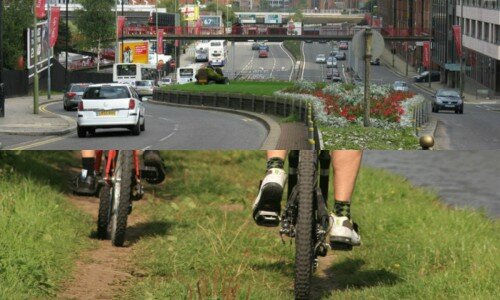
Birmingham businesses warn council congestion charge vision will damage city centre economy
On the day that West Midlands’ council leaders showcased a £2 billion package of rail, tram and rapid transit schemes at MIPIM, a Birmingham survey demonstrated continuing public resistance to forcing private cars off the road by imposing charges on drivers.
Local authority representatives gathered at the annual property fair in Cannes to proudly unveil proposals for the Local Connectivity Package, based on feeding fast and modern methods of public transport into the HS2 high speed rail line.
Meanwhile, Birmingham city council released details of a consultation into its own Mobility Action Plan (BMAP), which sets out plans for improved tram and bus services and discusses how to cut congestion on city centre roads.
A clear message comes through from the consultation, according to consultants WSP. And that is a firm belief that public transport must be radically improved before any form of congestion charging, workplace parking charging or city tax is introduced.
It’s exactly the same conclusion that was reached in the early 2000s, the last occasion that the city council wrestled with the idea of encouraging a switch to public transport by charging motorists more to drive into central Birmingham.
The response to BMAP shows that both members of the public and stakeholder groups are wary of imposing a ‘stick’ in the form of charges before ‘carrots’ in the form of improved public transport are available.
Businesses in particular, in the shape of the Chamber of Commerce, fear that any attempt by Birmingham to ‘go it alone’ in the West Midlands by levying a congestion charge would severely damage competitiveness and drive firms away.
SWP’s analysis of the consultation states: “While stakeholders appreciate that there is a significant funding gap which could be plugged by the introduction of a charging mechanism (which at the same time would help deliver behavioural change), and a number believe that motorists should contribute towards the funding of the new transport infrastructure, there is a strong feeling that it would not be appropriate to introduce charges until the new transport infrastructure is established.
“There are many concerns that the introduction of any sort of charging mechanism in Birmingham would impact on the economic competitiveness of the city. There are also concerns that any measures to discourage car-based traffic from high streets and the city centre may also impact on the economic viability of these centres.
As expected, there is strong support for better public transport. But there is little agreement on the best way to move forward.
Most respondents to the consultation agreed on the need to invest in mass transit of some sort, but there was no overall consensus on whether this should be delivered solely by Metro, a bus based Sprint system or a combination of the two.
The analysis continues: “Though there is an acceptance that in order to achieve the BMAP vision, Birmingham’s citizens, businesses and visitors to the city are going to have to change their travel behaviour, there is a reluctance to introduce punitive measures to realise this transformation.
“Whilst some accept there may be a need for measures to dissuade car use at a later date, there is definite agreement that they should not be introduced until the infrastructure, quality and service improvements are in place.
If penalties of any sort are to be introduced further down the line, there is a strong feeling that they should be based on the reallocation of road space, making it harder to access certain destinations by private car, rather than fiscal. There is clear agreement that above all, in order to achieve modal shift, BMAP needs to demonstrate that sustainable travel can be cheaper, quicker and more convenient than using the car.”
Undaunted by the consultation response, cabinet member Tahir Ali said: “There is real support for the vision we have set out, from both the public and from our partners.
“They want to see a transport policy that moves people and goods around the city quickly and reliably, including a mass-transit network, making the city accessible to everyone, particularly those with mobility problems.”
Similar Articles
ChamberlainFiles Regional Awards for Politics – Part Two 3
In the second and final part of our end of the year awards, we list
ChamberlainFiles Regional Awards for Politics – Part One 20
It’s been a year of high drama for Birmingham politics. We had a General Election with
2015: A Year of Transformation 12
The year got off to a promising start as far as the Birmingham economy was
2015: A Year of Devolution 8
Many people thought it would never happen. Some people thought it should never happen. But a
2015: A Year of Revolution 6
2015 was a year of momentous change for Birmingham and the West Midlands. A city










